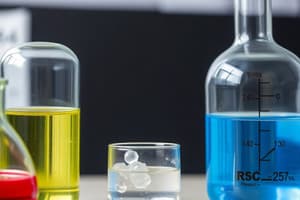Podcast
Questions and Answers
What is the characteristic of strong bases in water?
What is the characteristic of strong bases in water?
- Partially dissociate
- Release a few hydroxide ions
- Form an ionic compound
- Fully dissociate (correct)
Which of the following is an example of a weak base?
Which of the following is an example of a weak base?
- NaOH
- H2O
- KOH
- NH3 (correct)
What do acid-base reactions typically result in?
What do acid-base reactions typically result in?
- Creation of a salt (correct)
- Production of a solid
- Formation of a gas
- Release of heat
Which substances are formed when hydrochloric acid and sodium hydroxide react?
Which substances are formed when hydrochloric acid and sodium hydroxide react?
Why is understanding acids and bases crucial for understanding chemical changes?
Why is understanding acids and bases crucial for understanding chemical changes?
What type of ions do weak bases release in water?
What type of ions do weak bases release in water?
According to the Brønsted-Lowry theory, an acid is defined as a compound that:
According to the Brønsted-Lowry theory, an acid is defined as a compound that:
Which of the following is a strong acid?
Which of the following is a strong acid?
In an acid-base reaction, what is transferred from the stronger acid to the weaker base?
In an acid-base reaction, what is transferred from the stronger acid to the weaker base?
Which of the following is a weak base?
Which of the following is a weak base?
What is the difference between a strong acid and a weak acid?
What is the difference between a strong acid and a weak acid?
Which of the following pairs consists of a strong acid and a strong base?
Which of the following pairs consists of a strong acid and a strong base?
Flashcards are hidden until you start studying
Study Notes
Chemical Changes: Understanding Acids and Bases
When discussing chemical changes, it's essential to understand the role of acids and bases in these transformations. Acids and bases are compounds that participate in specific types of chemical reactions known as acid-base reactions. In this article, we will explore the basics of acids and bases and their involvement in chemical changes.
Defining Acids and Bases
According to the Brønsted-Lowry theory, an acid is defined as a compound that releases a proton (H+) when dissolved in water. On the other hand, a base is a compound that accepts a proton (H+) from an acid when dissolved in water. As a result, acid-base reactions involve transfer of hydronium ions (H3O+) from the stronger acid to the weaker base.
Common Acids and Bases
Some common acids include hydrochloric acid (HCl), sulfuric acid (H2SO4), nitric acid (HNO3), and acetic acid (CH3COOH). Similarly, common bases include sodium hydroxide (NaOH), potassium hydroxide (KOH), calcium hydroxide (Ca(OH)2), and ammonium hydroxide (NH4OH).
Strong and Weak Acids and Bases
There is a concept of strong and weak acids/bases. Strong acids are fully dissociated in water, releasing a large number of hydronium ions. Examples include hydrochloric acid (HCl) and nitric acid (HNO3). Weak acids partially dissociate in water, releasing fewer hydronium ions. Examples include acetic acid (CH3COOH) and carbonic acid (H2CO3).
Similarly, there are strong and weak bases. Strong bases are fully dissociated in water, releasing a large number of hydroxide ions. Examples include sodium hydroxide (NaOH) and potassium hydroxide (KOH). Weak bases partially dissociate in water, releasing fewer hydroxide ions. Examples include ammonia (NH3) and water (H2O).
Characteristics of Acid-Base Reactions
Acid-base reactions typically follow the following characteristics:
- The reaction must involve at least one acid and one base.
- The reaction results in the formation of an ionic compound called a salt.
- The reaction produces water.
Example of an Acid-Base Reaction
One well-known example of an acid-base reaction is the combination of hydrochloric acid and sodium hydroxide. When these two substances mix, they form sodium chloride and water.
Summary
Understanding acids and bases is crucial for understanding chemical changes. By knowing the definition and properties of acids and bases, you can better comprehend the various types of chemical reactions that occur in the world around us.
Studying That Suits You
Use AI to generate personalized quizzes and flashcards to suit your learning preferences.




